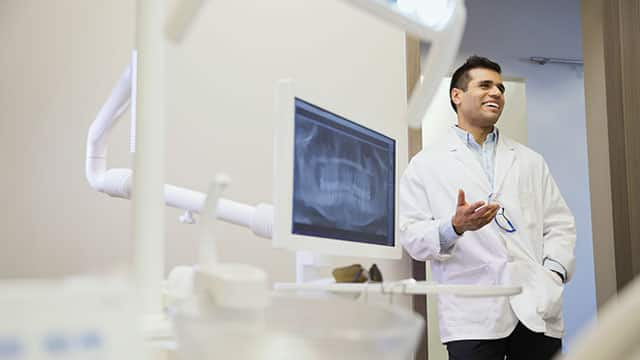The truth is that root canal treatments are actually meant to help you, not hurt you! So if you need to get one, don't worry. Root canal treatment eliminates bacteria from your infected root canal, preventing reinfection of your tooth. When you get a root canal, the dentist removes any inflamed or infected pulp from the root of the tooth and then cleans and disinfects it before filling and sealing it.
Let's take a look at root canal myths and signs that you need to see a doctor for root canal symptoms.
Myth #1: Root canals are usually painful.
When people think about root canals, the first thing that comes to mind is pain. The truth is that root canal treatments don't cause pain! The pain actually comes from the infected tooth that's being treated. Root canal treatments are painless and work to eliminate the pain caused by the infected tooth. Your dentist will use a local anesthetic to numb the tooth and the surrounding area. That way, you don't feel a thing!
Myth #2: The tooth's nerves are removed, so I won't feel any pain.
Many people believe that once they have had a root canal treatment, they will no longer have the ability to feel pain in the treated tooth. This isn't true. The tooth may still feel pain but will no longer be sensitive to hot or cold food or beverages. Also, note that the area around your tooth might be sensitive for a few days after treatment. If this happens to you, let your dentist know so they can prescribe something to help support your comfort.
Myth #3: Root canal treatments cause illness.
Despite the faulty study in the 20s (mentioned above) that claimed that root canal treatments make people ill, it's not true. There's no valid, scientific evidence that links root canal treatments to disease in other areas of the body.
Myth #4: Why bother getting a root canal done when I'm just going to need the tooth taken out eventually?
Another myth! Most root canal treatments are successful and result in the infected tooth being saved. So, getting one might actually save you from having your tooth extracted. The truth of the matter is the longer you postpone getting a root canal treatment, the more at risk you are to lose a tooth.
Myth #5: I'm not feeling any pain, so I don't really need a root canal.
Believe it or not, many teeth that require root canal therapy do not cause pain. Just because there's no pain doesn't mean your tooth is okay. Your dentist and endodontist determine if you need a root canal by looking at your tooth's pulp. If it's damaged or infected, you'll need a root canal treatment, even if your tooth doesn't hurt.
If you see something that looks like a pimple near your damaged tooth, see your dentist right away. The "pimple," called a fistula, is a tunnel of tissue that drains pus from an infection. When this happens, you have no pain because the fistula keeps pressure from building in the tissue. It's important to know that the infection must be treated to prevent nearby tissues from becoming infected.
Myth #6: A root canal means I'm having the roots of my tooth, or my whole tooth, removed.
The whole point of root canal therapy is to save a tooth, not remove it! During a root canal, the canals are cleaned and shaped on the inside only. The nerve tissue and pulp are removed along with some of the root's inside parts to ensure that all bacteria are removed.
Myth #7: After I get a root canal, I won't have to go back to the dentist for a long time.
Once you receive root canal therapy, you will need to go back to your dentist for follow-up appointments. What happens at these appointments? You'll have a permanent filling or crown put on the tooth. When you finish with a root canal treatment, the dentist will place a temporary filling after the pulp has been removed to protect the root from infection. This is meant to last for only a short time. A permanent filling or crown must be placed to ensure that bacteria don't leak into the canal. So, you will need to go back!
When to See a Dentist About Root Canal Symptoms
Root canals are needed for deep cavities, issues from a previous filling, or a cracked tooth. Getting treated as soon as possible is essential in saving your teeth and preventing the infection from spreading to other tissues. Here are some root canal related symptoms to look out for:
If you notice any of these symptoms, contact your dentist right away.
Now you know the scoop on root canals, so you don't have to be afraid if you need one. There are plenty of myths out there about root canals. But the truth is that they're super helpful, surprisingly not painful, and can save your teeth from being extracted. If you notice any root canal related symptoms like sensitivity to hot and cold or pimples on your gums, contact your dentist as soon as possible. It's essential to get treated if you need a root canal, so don't wait. You'll be glad to get the help you need. Plus, you'll become a living legend to debunk the myths of root canals.
Oral Care Center articles are reviewed by an oral health medical professional. This information is for educational purposes only. This content is not intended to be a substitute for professional medical advice, diagnosis or treatment. Always seek the advice of your dentist, physician or other qualified healthcare provider.
ORAL HEALTH QUIZ
What's behind your smile?
Take our Oral Health assessment to get the most from your oral care routine
ORAL HEALTH QUIZ
What's behind your smile?
Take our Oral Health assessment to get the most from your oral care routine















